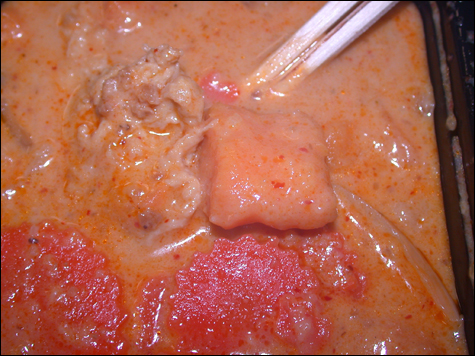
NO PASTE: Simmered whole nuts enrich the peanut curry. |
| Green Elephant | 608 Congress St, Portland | Mon-Fri 11 am-2:30 pm, 5-9:30 pm; Sat noon-2:30 pm, 5-9:30 pm | Visa/MC/Amex/Disc | 207.347.3111 |
Any group — whether a city, a cohort of friends, or a couple — must be cautious about where they first fall for vegetarian Asian food — a cuisine perfected over two millennia of Buddhism. A friend of mine had his first date with his future wife at a dingy vegi-Chinese spot in north Berkeley. They went back nearly every week for nine years. It usually starts when we are young, when idealism requires food that is both inexpensive and uncruel. For years after we are drawn back by an amalgam of inertia, nostalgia, and craving for savory soy.So it is lucky for us that Portland’s first true vegi-Asian place is Green Elephant. They have transformed the space once occupied by Portland Hunan into something decidedly undingy. The curtains are gone, so light from the huge front window can spill in on the new bamboo floor and light-wood tables. The space feels clean, elegant, and inviting.

The food could be described the same way. For the most part dishes at Green Elephant come with light, thin sauces that allow the flavors of fresh vegetables and soy proteins to blend and enhance each other. The peanut curry, for example, had none of the stickiness that mars this dish so often. Rather than using a paste, some whole nuts were simmered in the rich yellow broth, adding to the sweet curry without overwhelming it. This sauce was wisely paired with a soy protein that had enough of its own salty flavor to enhance the dish. A red curry with slightly tender yellow and green beans had more zing and was thus more appropriate to a flavor-soaking and pleasantly chewy tofu. The tofu was not quite as successful in the subtle sauce of a tofu delight — a dish dominated by the sweet and bitter flavors of its eclectic pile of vegetables.
Green Elephant does some very good things with understated tastes that develop on the palate in interesting ways. This was the case with a green tea noodle served in a miso broth with cabbage, soy, seaweed, and scallion. The noodle added more through aroma than straightforward taste, and the miso was more aromatic and mouthwatering than the perfunctory bowl that usually comes before sushi — though it was not the sort of house-made signature broth one might expect from a miso served as an entrée. The tempeh was tender, not in the least slimy, and not too chewy. The seaweed glistened appealingly.
The starters were very good if imperfectly sauced. I wanted something a bit fishier in which to dip the crunchy spring roll with rice noodle and tender mushroom. Odder still was a sticky sweet-and-sour to accompany a mushroom tempura. The breading did not quite achieve the ideal Japanese lightness, but the chewy mushrooms had enough flavor to work with the ample crunch. The same sweet sauce came with the soy nuggets. Tough to the fork, but moist and tender to chew, these nuggets had a flavor and mouthfeel remarkably similar to a pressed McNugget. (I mean that in a good way.)
Elegant but affordable, progressive but pleasurable, pan-Asian but not dangerously eclectic, a touch didactic (a glossary chalked on the wall defines tempeh and soy), but charmingly so, with affordable wine and interesting tea — Green Elephant is something Maine could use. In recent years the vegans of Portland have pressed their cause through foie gras protests and preachy “festivals” (see "Ethical Eating," September 15, 2006, and "The Taste of Sanctimony," May 11, 2007, both by Brian Duff). On the national level vegans turned a manifesto into a best-seller (Skinny Bitch) by packaging animal-rights arguments as diet advice from a fashion model. But while a good model can touch the soul, in the long run vegans will make their arguments best by making food that affirms life through the palate, not despite it. In this way Green Elephant is a big step in the right direction.
Brian Duff can be reached at bduff@une.edu.